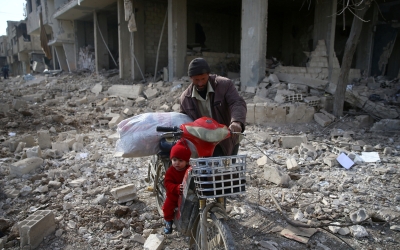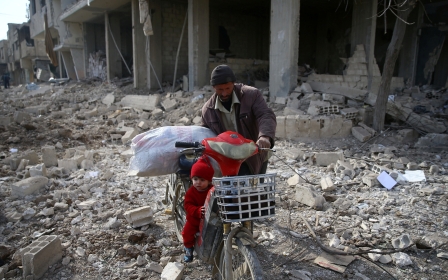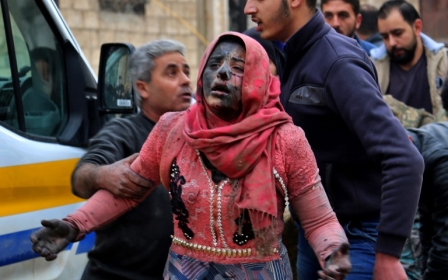Syrian refugee children 'cannot imagine' going back after 10 years of war
The majority of children displaced by Syria's protracted ten-year conflict have said they cannot imagine returning to the country, Save the Children has said.
In a report released on Tuesday, the charity said that 86 percent of the 1,900 displaced children surveyed in opposition-held areas of Syria, Jordan, Lebanon, Turkey and the Netherlands said they could not imagine a future in Syria, with a third saying they would rather live in another country.
In contrast, only three percent of children surveyed in Turkey, nine percent in Jordan and the Netherlands and 29 percent in Lebanon said they would want to return to the country.
"I wish to live in any country other than Syria, where it's safe, and there are schools and toys," Lara, a seven-year-old who lives with her family in a camp in Idlib's Maarat al-Numan told Save the Children.
"It's not safe here, the sound of dogs scares me, and the tent is not safe."
New MEE newsletter: Jerusalem Dispatch
Sign up to get the latest insights and analysis on Israel-Palestine, alongside Turkey Unpacked and other MEE newsletters
The charity's findings also showed how access to education impacted the outlook many Syrian refugee children had about their future, with those in Europe feeling more hopeful than those displaced in the Middle East.
Jeremy Stoner, Save the Children's regional director for the Middle East and Eastern Europe, said the protracted conflict led many young people to fear for their future.
"Whether inside or outside Syria, children affected by the conflict are still struggling to feel at home where they are," Stoner said.
"This ten-year war has cost Syria's young people their childhoods, but the world should not allow it to rob them of their future.
"Protracted conflict has led to fear and pessimism about children's ability to build their lives in a country scarred by war."
Last week, a report by the International Rescue Committee (IRC) revealed that the vast majority of health care facilities in rebel-held areas had been destroyed by forces loyal to President Bashar al-Assad.
"My house was bombed while I was pregnant. I suffered from severe bleeding and lost my first child. I was unable to go to the clinic because I was afraid of the bombing," Layla, from the town of Atareb in Aleppo, told the IRC.
The Syrian civil war started as a largely peaceful uprising against the Syrian government in March 2011, but was brutally repressed and quickly morphed into a complex, multi-faceted war.
Since then, around 6.6 million people have been forced to flee the country and a further 6.1 million are internally displaced.
No accurate figures exist for the number of those who have been killed during the war, but as of 2018, there were at least half a million fatalities.
Middle East Eye delivers independent and unrivalled coverage and analysis of the Middle East, North Africa and beyond. To learn more about republishing this content and the associated fees, please fill out this form. More about MEE can be found here.





